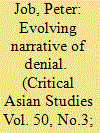| Srl | Item |
| 1 |
ID:
177987


|
|
|
|
|
| Summary/Abstract |
This article reinterprets the Indonesian invasion of East Timor as a ‘diplomatic counter-revolution’. Using the central archival records of the Suharto regime for the first time in English-language scholarship, it unearths a diplomatic campaign undertaken by agents of the New Order to secure international support for an Indonesian invasion of East Timor. This diplomatic offensive spanned Southeast Asia, non-aligned and Afro-Asian networks, Western capitals, international institutions and media circuits, and global capital markets. Its success tipped the balance of power in Jakarta away from advocates of restraint like Adam Malik and towards advocates of annexation like Ali Murtopo. The diplomacy behind Indonesia's invasion of East Timor reveals that the architecture of globalization, lauded by some scholars as inherently liberatory, was in fact agnostic, capable of being turned to counter-revolutionary purposes in addition to revolutionary ones. And it suggests that diplomacy itself had been counter-revolutionized, as geopolitical and geoeconomic change combined to make the international system, particularly the states of the Global South, far more hostile to state-making claims and transformative world-making projects.
|
|
|
|
|
|
|
|
|
|
|
|
|
|
|
|
| 2 |
ID:
160931


|
|
|
|
|
| Summary/Abstract |
As research by the Commission for Reception, Truth and Reconciliation in East Timor documents, the years 1975–1980 constituted the worst period of the Indonesian occupation of East Timor, during which grave human rights took place involving a high loss of life. In Australia, the government headed by Prime Minister Malcolm Fraser (1975–1983) sought to present itself as a supporter of human rights and the international rule of law. It also prioritized relations with the Suharto regime, which it saw as key to its policy position in Southeast Asia. These two positions came into conflict due to the Indonesian invasion of East Timor. The Fraser government therefore worked to propagate a narrative concerning East Timor which denied the seriousness of the situation, distorted the historical narrative, deflected blame from Indonesia, and depicted the Australian position as principled and realistic. This paper examines the development of this narrative as events progressed and information concerning the crisis in East Timor came to the attention of the outside world. It also examines how the Fraser government employed this narrative internationally in order to protect the Suharto regime from scrutiny.
|
|
|
|
|
|
|
|
|
|
|
|
|
|
|
|